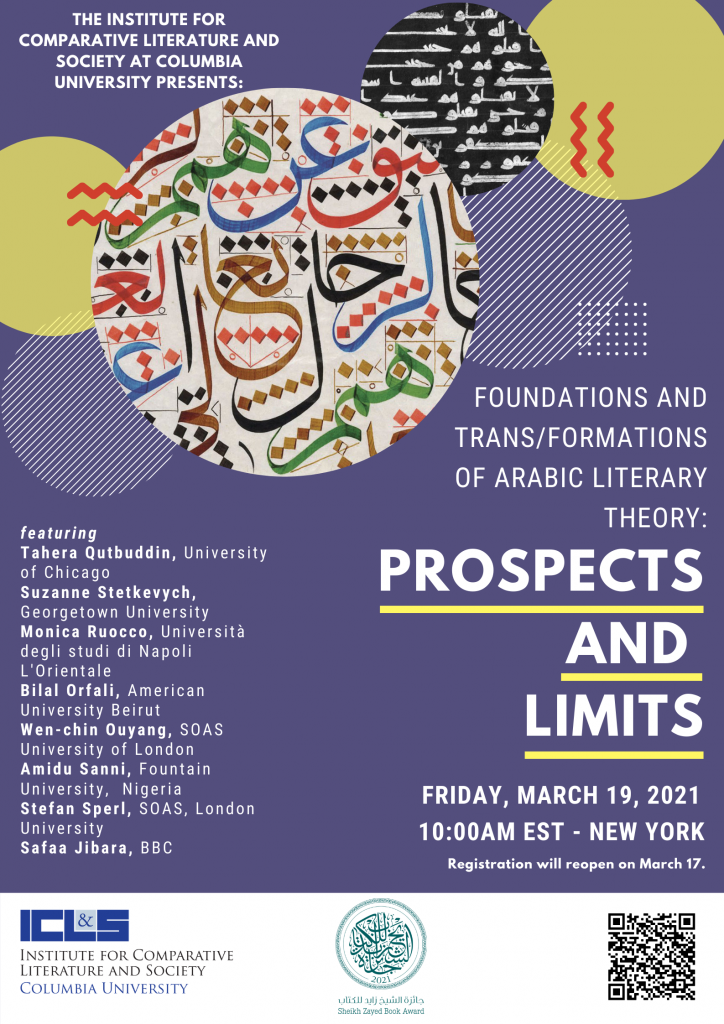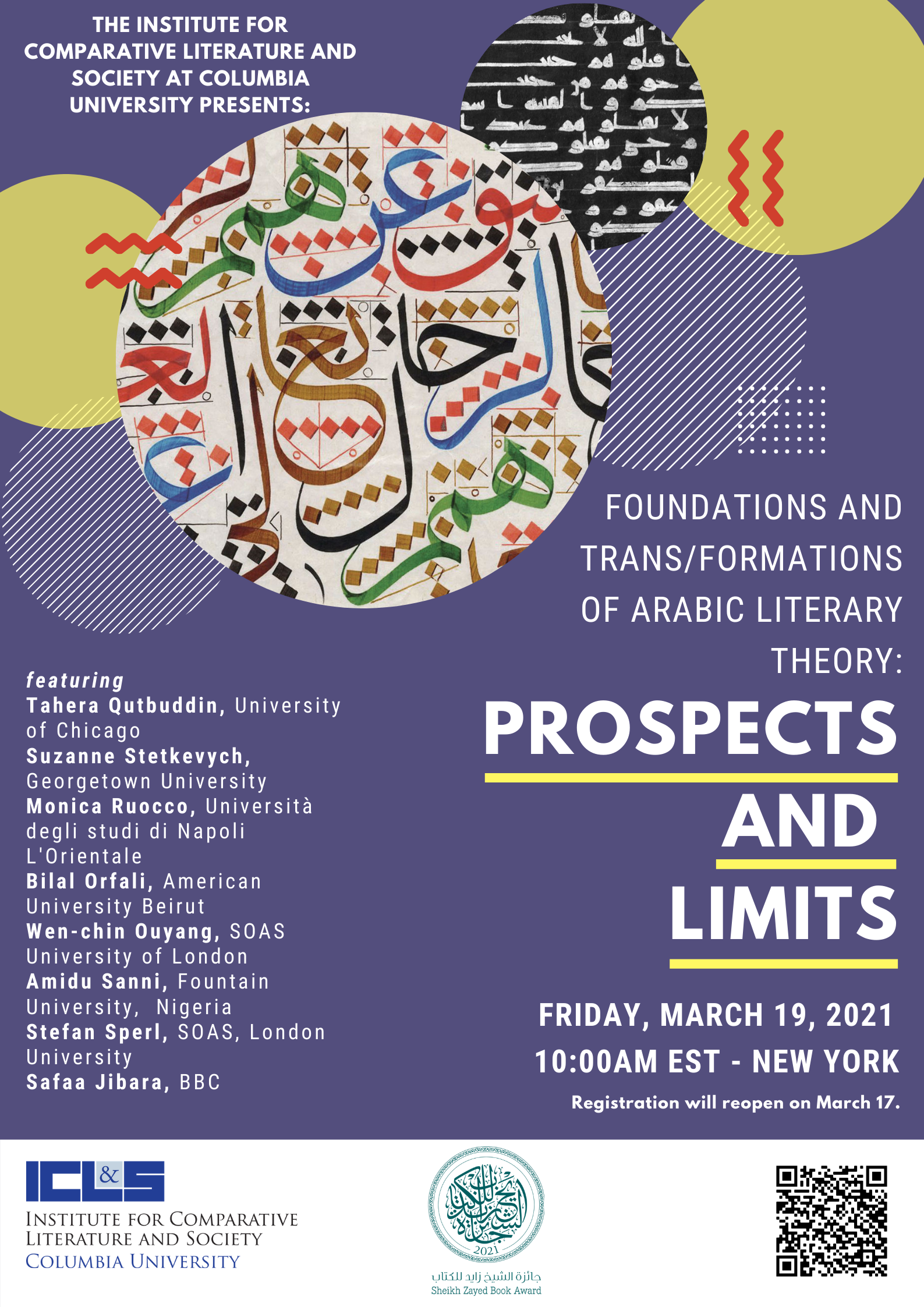DEADLINE EXTENDED: CFP Foundations and Trans/Formations of Arabic Literary Theory: Prospects and Limits

Foundations and Trans/Formations of Arabic Literary Theory: Prospects and Limits
Hosted by the Columbia University (Institute for Comparative Literature and Society) and the Sheikh Zayed Book Award Committee.
Preliminary Virtual Discussion Panel:
Arabic Literary Theory: Prospects and Limits
March 19, 2021, (10 am EST/New York time)
First in-person Session:
*December, 15-17, 2021, Columbia University; presented in cooperations with the Arabic Studies Seminar at Columbia University
Please see the guidelines for participating and additional information below
[*Dates subject to change due to current health situation.]
The primary focus of this conference is on Arabic literary theory, engaging with its development from the pre-modern era up to the present. Literary Theory is not limited to the classical or premodern reading of poetics and adab, but also inclusive, and very strongly, of transformations since the late nineteenth century. It is a navigation among the fields of culture industry, circulation, dissemination, authorship, copyright issues, arts, cyberspace.
We invite scholars to explore a plethora of thematic issues tied to the challenges of mapping, reconstructing, and studying varied sets of Arabic literary theoretical frameworks with the aim of identifying cross-temporal and trans-local conceptualizations and terms for a genealogy of Arabic literary theory. While focusing on the formation, transformation, re-organization and enduring legacy of pre-modern literary conceptualizations across the Arabic literary continuum, the conference approaches modernist literary explorations as invitations to the study of paradigmatic shifts in Arabic literary theory. The conference aspires to cement a dialogue between classical and modern epistemic systems while questioning their boundaries. It also encourages new explorations in post-nahḍah interdisciplinary forays, engagements with social science, and the role of individual writers in initiating or consolidating sites of revolt or turns to authentication.
Possible themes include:
-The presence or disappearance of the qaṣīdah
-Literary tarassul [epistolary art]
-Contending with Orientalism
–Nahda literary theory
-Theories of race
-Genesis of narrative writing and storytelling
-The theoretical grounds for ‘plagiarism’
-Philological explorations
-Birth of the Arabic novel
-The dispute with al-muḥdath and al-muḥdathūn
-Rise of al-badī‛ compositional style and the resulting badī‛iyyah
-Rhetoric and its multiple dimensions
-Identity, social media, and cyberspace
-visual and spatial narrative forms
-Material and immaterial cultures
-Deviation and dissent
-Arabs and their others: Explorations beyond Eurocentric boundaries
-Exilic poetics and ḥanīn, self-narrative and biography; refugee and migration writing
The conference requests active participation, polished papers, and salient contributions to Arabic literary knowledge. Participants are welcome to approach literary texts as “insiders,” thus also bridging the gap between literary, social, linguistic, and semantic studies. With some focus on modernity and its byways.
The whole conversation should be rooted in theory.
Participation Guidelines
Open Event: Preliminary Virtual Discussion Panel (March 19, 2021)
All interested scholars were encouraged to register (registration closed January 12) to follow the preliminary discussion, the keynote speakers’ introductory notes, and participate in the debate. No paper submission is requested at this point. It is sufficient to indicate the topics of major interest during the online registration and if you intend to submit a contribution or not.
Join us in Paris and New York Plenary Sessions
In order to join the Paris (June 27-30, 2021) and New York (Dec 1-3, 2021. Date is subject to change.) Plenary Sessions please submit an abstract of no more than 400 words and a short biographical note (150 words) to the conference email no later than February 11, 2021 [arabicliterarytheory@gmail.com].
We ask that abstract submissions be written in English. Translation will be provided at the event.
Only new contributions would be considered. Both plenary meetings expect polished, publishable papers for JAL, and then as proceedings in Trans/formations Book Series.
Please specify if you would like to participate only in the first session, or the second, and/or the virtual panel discussion. A note to this effect on the left side of the abstract is appreciated.
Notifications about abstracts selection process will be sent by the end of March. *Due to the deadline extension, selection notifications will be delayed from the original planned announcement of March 6.
In planning since 2019, this conference was collaboratively organized with the Committee of the Sheikh Zayed Book Award
Conference Directors/Investigators [Organizing Team]:
Muhsin al-Musawi, Professor, MESAAS, Columbia University
Ali Bin Tamim, Professor and Secretary General of Sheikh Zayed Book Award
Lydia H. Liu, Wun Tsun Tam Professor in the Humanities and ICLS Director, Columbia University
Chiara Fontana, Research Fellow, Ca’ Foscari University of Venice.
Elizabeth M. Holt, Associate Professor of Arabic; Director, Middle Eastern Studies, Bard College
Tarek El Ariss, Professor and Chair of Middle Eastern Studies at Dartmouth
Gonzalo Fernández Parrilla, Professor of Arabic Language and Literature, Universidad Autonoma de Madrid
Nizar Hermes, Associate Professor and Chair, Department of Middle Eastern and South Asian Languages and Cultures, University of Virginia
Rebecca Johnson, Associate Professor of English and the Humanities, Director of the Program in Middle East and North African Studies, Northwestern University.
Bilal Orfali, Chairman, Professor, and Sheikh Zayed Chair of Arabic and Islamic Studies, American University Beirut
Conference Proceedings Investigators:
Sarah R. bin Tyeer, Assistant Professor, Columbia University
Lara Harb, Associate Professor, Princeton University
Boutheina Khaldi, Professor, American University of Sharjah
Questions should be emailed to arabicliterarytheory@gmail.com.









